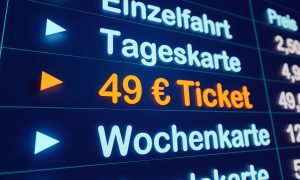Coalition for Reimagined Mobility (ReMo) Website Update
Moving forward, ReMo updates can be found at secureenergy.org. All new updates, regulatory comments, and current initiatives can be found there.
This website is now maintained as an archive of past ReMo materials and activities.
Germany’s Nationwide Transit Pass is a Model for Expanding Travel Freedom Throughout Europe

Photo: Thomas Demarczyk via iStock
By Jason Islas
Germany is betting that making access to transit convenient and affordable will make it a more attractive mobility option and encourage people to shed their cars for most trips. And in doing so, is showing the way for the rest of Europe to transform their transit systems.
The country’s latest move—a monthly pass for €49 ($54) that gives holders unlimited travel on local and regional trains as well as all city buses, subways, and trams in every municipality across the country with a single digital ticket—will help Germany meet the region’s ambitious climate goals while reducing its overreliance on oil, a dependency that leaves all of Europe vulnerable to price and supply volatility from hostile governments and dictators.
It also gives Germans increased travel freedom. As Bloomberg puts it, Germans can now travel from Hamburg in the north to the Swiss border in the south on a single digital ticket. Additionally, data gathered from this program will help other European countries understand the impact of programs like this and how to tailor implementation to their specific transportation needs.
This is the kind of bold action Germany—and other EU member states—must take to meet emission reduction targets. It is also an example that states in the U.S. could seek to replicate. In ReMo’s recent white paper, A Policy Path to Achieving Europe’s Green Digital Revolution with Sustainable, Smart and Seamless Mobility, we recommended exactly this kind of fare payment integration to help achieve the EU’s transportation goals. Germany has consistently fallen behind its goals to reduce transportation emissions and is not where it needs to be to hit the target of halving pollution by 2030.
Deutschland-Ticket, as the new pass is called, builds on a three-month pilot launched last summer specifically to help Germany weather the energy crisis brought on by Russia’s invasion of Ukraine.
While the idea may have been a response to a specific geopolitical crisis, it promises to have long-term impacts on transportation choices that will endure much longer than the current war in Ukraine. While the program launched on Monday, May 1, already millions of Germans have signed up.

Photo: Torsten Asmus via iStock
Planners have long advocated for an approach like this. Mobility as a service (MaaS)—giving riders the ability to choose from a menu of transportation options that they can access with one payment, rather than having to purchase individual tickets for different agencies or even when switching modes—creates a more convenient and smooth experience for riders, and can more effectively connect people to opportunities.
Lowering barriers to transit use—by making it more affordable, seamless, and convenient—promises to draw more riders, which will require investment in more service. But Germany should also look to private mobility companies to expand choice.
The initial Deutschland-Ticket program excludes private operators. Future iterations of this program can build on its success by working with private companies providing transportation in the country to expand the choices people will have and increase the national transportation network’s capacity at no cost.
Creating a nation-wide transit ticket – at an attractively low cost – is a huge step in the right direction. It’s clearly popular and it makes the experience of using transit smoother and inviting while also requiring transit agencies to update their ticketing systems for a digital age.
The learnings that will come from this will help inform how other European countries and beyond can implement similar programs and how Germany can improve on this iteration. We will also be watching for lessons learned in how to digitalize and integrate disparate systems and build customer-facing platforms to support managing and planning their trips.
It’s clear that Germany is on the right path to transform the way people use transit—and reap the economic, national security, and climate benefits.
Jason Islas is Senior Manager for Policy Communications at ReMo. He previously worked in the shared micromobility industry.
